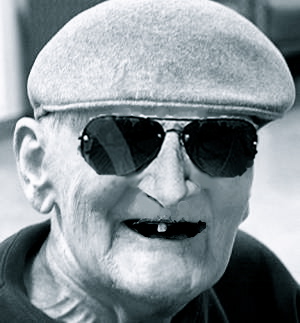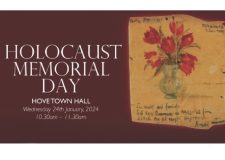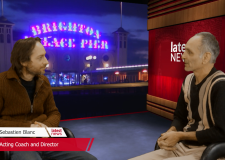I remember…
Aldrington! These days it’s a typical middle-class enclave where the tapping of Apple Mac keys mingles with the scent of freshly-baked homemade bread, but what was it like way back in the 1930s? Local resident, 99-year-old Samson Flywater remembers…

“Oh yes, Aldrington is quite hoity-toity these days isn’t it? Full of yummy mummies in Boden frocks, pushing those irritating, chunky, three-wheeled buggies that are slightly too big to fit comfortably on the bus; nattering away on their iPhones about house prices and catchment areas and how their commuter husbands aren’t attentive enough and they’re thinking about having an affair with the guy down the gym; constantly stopping at organic vegetable stores and coffee shops for a flat white and a slice of carrot cake. Well it wasn’t like that eight years ago, no sir.
There weren’t no Boden, no gyms, no house prices, and certainly no bleeding carrot cake.
Poets Corner was much bigger in them days – it encompassed many of the minor poets. We had Manley Hopkins Street, Chatterton Gardens, Abse Road, Alvarez Close, Edna Street. Vincent Millay Drive. I myself was born in Theodore Roethke Lane in 1912. I was a bonny boy and was immediately nicknamed ‘Buster’, both because of my cheerful, rubicund appearance and my resemblance to the yet-to-be-born, Buster Merryfield in his later years.
Those were hard times. As everybody knows, back then the districts of Brighton and Hove were separate states with strict border controls and their own rules and laws. Aldrington was a lawless place where life was violent, brutal, and short. Its main industry was the production of bootleg hooch, which was then covertly smuggled into Brighton. The bloke in charge was Harry ‘Tugg’ Bessemer, who was a midget, only 16 inches tall. He would refer to himself as ‘quite tall actually’ all the while glaring around as if daring someone to contradict him.
Harry ran his business from The Aldrington pub, which in those days was a great venue for live music. Oh they all sang there: Al Bowery; Bessie Smith; Billie Holliday; Willy Worry; Donovan’s Dad and The Slimms. I was in there one day sweeping the floor when who should come in but Mr. Charlie Chaplin himself. Chaplin was carrying a bunch of flowers and asked to be introduced to Josephine Baker, who was performing there at the time. I refused, explaining that this was against company policy. Chaplin became quite irate, stamping his foot and calling me several unprintable things, but I stuck to my guns and he left. Later that day I discovered that in revenge he’d had my house demolished and both my parents killed, so I guess he won that one. But I still enjoyed his film City Lights, which was released later that year.’





















